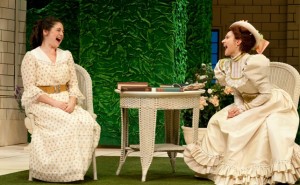The Importance of Being Earnest: The audience is repeatedly beaten with slapstick humour.

Oscar Wilde’s masterpiece, The Importance of Being Earnest, is a biting satire of Victorian artifice. You wouldn’t think a play criticizing a society where appearance trumps substance, so close to our own image-obsessed society, would require too much tweaking. What makes this play so funny, other than Wilde’s mastery of language, is precisely that it works within the social conventions of late Victorian London. The play works best when the characters let their actions speak for themselves, without added trappings. I talk a lot about directors’ seeming lack of faith in their audience’s ability to get and be amused by a more subtle type of comedy. It often feels like there’s a fear that, unless we’re repeatedly beaten with slapstick-type humour (with side-winks, just in case we forget to laugh), we will fall asleep in our seats. Ted Dykstra’s version of The Importance of Being Earnest falls into this category, as he inserts needless physicality and self-reflexiveness in the presentation. This denies the play its gravitas by reducing it to something trivial and renders the production forgettable.
The Importance of Being Earnest is a story about two friends, Algernon (Alex McCooeye) and his friend Jack (Christopher Morris) who, having little else to do in their privileged lives, make up imaginary friends and relations in order to get away from real-life ones, who they can’t stand. The characters in this version of The Importance of Being Earnest roll their eyes, throw muffins at each other, and, most inappropriate of all, hide under the skirts of their beloveds in the presence of the latter’s (very proper) mother. They leap over settees and foot stools in a way that would have undoubtedly gotten them thrown into Bedlam in a second.
Alex McCooeye as Algernon is the best of the bunch, as he encapsulates the devil-may-care, amused attitude his character possesses for the world very adeptly. He’s highly amusing without being overdone. Christopher Morris, on the other hand, seems a bit modern in comparison, though his Jack does provide a good balance for McCooeye. Still, he could have done without the foot stomping. Miss Prism (Lois Anderson), the spinster governess of Jack’s young ward, speaks in such an irritating, nasally voice, that it’s hard to take in what she says. The result is that the audience end up laughing at her, not at what her characters serves to criticize. Likewise, Karen Robinson, as Lady Bracknell, the dowager dame of social propriety and stuffy hypocrisy, comes off as if she is a new graduate of the strictest enunciation school in the country. Unfortunately, there is very little else to her performance other than good diction.
The almost neo-classical set design was another confusing element in the play. Victorians are known for dark tapestries and overly-decorated, lush rooms, so the sparse, almost modern set is out of place and quite jarring.
The NAC’s production of The Importance of Being Earnest misses the mark. It unfortunately turns a powerhouse of social critique into a rather forgettable play that spends most of its time making sure the audience is, indeed, amused than in creating a good production. Trust in your audiences that they will get the more subtle humour and I promise you, they will thank you.
The Importance of Being Earnest continues until Nov. 8. Tickets: NAC box office, 1-888-991-2787, ticketmaster.ca
Director: Ted Dykstra
Set and costumes: Patrick Clark
Lighting: Leigh Ann Vardy
Composer/Sound; Creighton Doane
Cats:
Miss Prism…………………………………………….Lois Anderson
Lane……………………………………………………Herbie Barnes
Cecily…………………………………………………..Natasha Greenblatt
Gwendolen……………………………………………..Amy Matsio
Algernon……………………………………………….Alex McCooeye
Rev. Canon Chasuble………………………………….Andrew Moodie
Jack…………………………………………………….Christopher Morris
Lady Bracknell…………………………………………Karen Robinson
Merriman……………………………………………….David Warburton